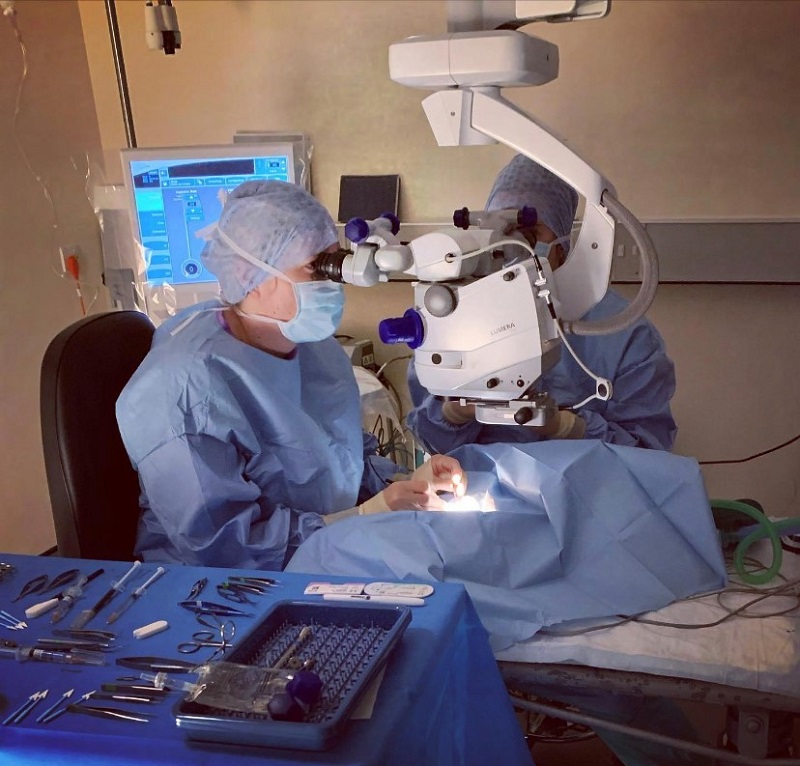A Transdisciplinary Triumph – First Cataract Surgery on Guinea Pig at the RVC
Clinical Connections – Spring 2021
By Sean Sum, final year BVetMed student
Close collaboration between the Ophthalmology Service and Exotics Referral Service saw a Guinea pig successfully undergo cataract surgery. This is the first recorded procedure of its kind in the UK.
Two-year-old Poppy was referred to the ophthalmology team at RVC Small Animal Referrals for loss of vision. She was diagnosed with bilateral mature cataracts and phacolytic (lens-induced) uveitis.
Although surgery is the sole definitive treatment for restoring vision in cataractous eyes, it is an elective procedure not commonly undertaken in Guinea pigs due to the prohibitive cost of surgery. However, Poppy’s owner felt that her quality of life was significantly hampered by her loss of vision and was keen to have surgery performed.
The procedure was performed by Charlotte Dawson, Head of the Veterinary Ophthalmology Service, and was assisted by Resident Amy Andrews. While this was Dr Dawson’s first cataract surgery on a Guinea pig, she was able to extrapolate from her experiences with rabbit cataract surgeries, which present similar challenges and which the RVC team has performed for a number of years.
The small anatomical size of Poppy’s eye meant that a special phacoemulsification tip had to be ordered for her surgery. Guinea pigs also have a shallow anterior chamber which meant there was less room for the surgeons to manipulate their instruments.
The surgery was aided by the use of the Ophthalmology Service’s new operating microscope which was purchased with the support of the Animal Care Trust. This significantly improved the optics, visibility, and ease of performing the surgery. The microscope also allowed for the procedure to be recorded, and has since been viewed by other staff and students at the RVC.
The density of Poppy’s cataract alongside the fibrinous sheet beneath the anterior lens capsule made phacoemulsification, the conventional technique for cataract surgery, not viable. An intracapsular lens extraction (ICLE) was performed instead, which involved removing the lens in its entirety.
Given the higher anaesthetic risks and postoperative complications for Guinea pigs, Jo Hedley, Head of the RVC Exotics Referral Service, and her team were present to lend their expertise. Professor Ludovic Pelligand and Dr Alfonso Rodriguez Mulet from the Anaesthesia and Analgesia Service also helped to oversee Poppy’s anaesthesia.
Following lens removal of the right eye, thoracic auscultation revealed concerning respiratory signs. Prioritising Poppy’s welfare and anaesthetic safety, surgery on the left eye was decided to be postponed, which could be considered in the future.
Poppy was closely monitored by the Intensive Care Unit following surgery and made a smooth recovery. On discharge, her abnormal thoracic sounds had resolved, and her gut sounds were within normal limits.

Improvement to quality of life
On subsequent re-examination, Poppy’s owner noted that she is now visual in the right eye again. Although easily startled before surgery, Poppy is now a lot brighter and happier. Poppy’s owner is very pleased with the improvement in her quality of life following surgery.
The joint expertise and collaboration between the different services at the RVC made it possible for the anaesthetic risks and anatomical challenges of Poppy’s surgery to be well managed and exceptional postoperative care delivered.
Underlining the importance of the transdisciplinary approach of RVC clinicians, Dr Andrews said: “We are very fortunate here because we have the exotics team who come to visit the Queen Mother Hospital for Animals once a week. That enables us to have more of an exotics caseload and we can get them involved with anaesthetic complications and post-operative care as well.”
Poppy, being the first Guinea pig at the RVC to have undergone a cataract surgery, sets a strong precedent for future cases in the country and beyond. Having procured a new phacoemulsification tip and the Zeiss Opmi Lumera 700 ophthalmic microscope recently, the Ophthalmology Service is also better equipped for the surgical management of other Guinea pigs and small mammals. Such cases also offer a unique learning experience to residents undertaking training at the RVC.
